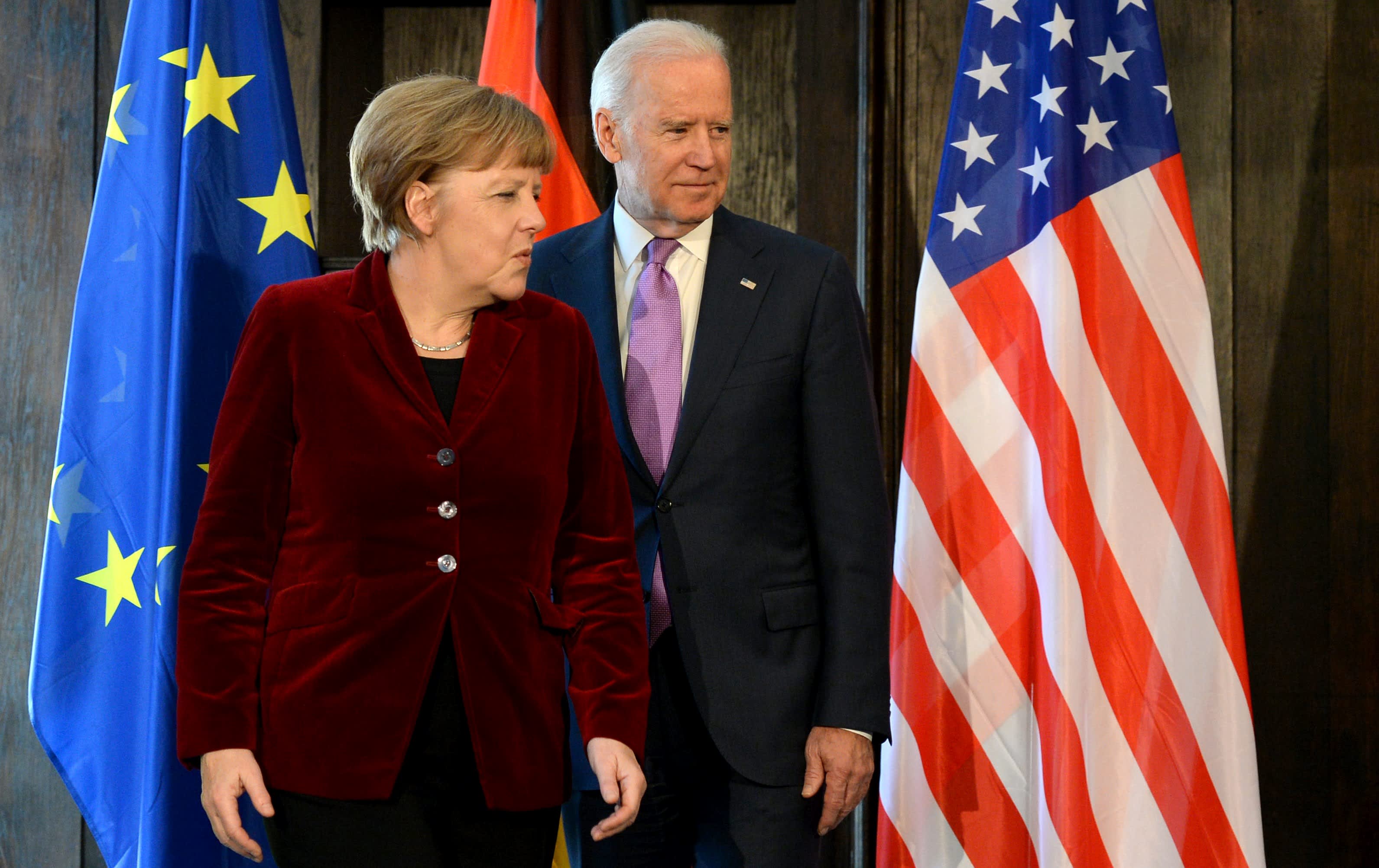
German Chancellor Angela Merkel and US Vice President Joe Biden in 2015.
CHRISTOF STACHE | AFP | Getty Images
FRANKFURT — “The times in which we could rely fully on others — they are somewhat over.”
Those were the words from German Chancellor Angela Merkel after a difficult G-7 and NATO meeting with President Donald Trump in 2017. That sentence marked a departure from her usual sentiment toward the trans-Atlantic relationship and was widely seen as a watershed moment.
Despite a flurry of head-turning statements from the Trump administration, Merkel preferred to keep her calm for the next few years, likely waiting for a new president in 2020.
She and the German establishment got what they wanted: In Joe Biden there’s a new U.S. leader with a clear multilateral and pro-European agenda.
But despite relations being much more friendly on the surface now, some central issues remain.
“The big topics like Nord Stream 2 and the NATO spending target of 2% of GDP will remain contentious issues,” said Andreas Dombret, a member of the board of the Atlantik Brücke, a non-profit which promotes German-American relations, in a phone interview with CNBC. Nord Stream 2 is the Russian-led gas pipeline which, it is hoped, will provide Europe with a sustainable energy supply.
“There is no straight go-ahead with the new U.S. administration especially when it comes to a free trade agreement, that is probably not in reach,” Dombret added.
Attitudes toward China
To predict the future of German-U.S. relations is not an easy task as many factors come into the mix. For instance, it seems that the U.S. demands a clear commitment to prioritize relations with the White House over those with China and Russia.
“We have to push back against the Chinese government’s economic abuses and coercion that undercut the foundations of the international economic system,” President Joe Biden said in his speech during the Munich Security Conference in February.
“The Kremlin attacks our democracies and weaponizes corruption to try to undermine our system of governance,” he added in another part of this speech.
Germany has typically put its own economic interests above anything else when it comes to its relationship with Beijing. But that is bound to change.
“There is a great deal of pressure to change attitudes towards China which is building up from inside Germany, parties like the Greens, parts of the (Merkel’s) CDU want a tougher line,” said Noah Barkin, a managing editor with Rhodium Group’s China practice based in Berlin.
When it comes to Russia, things are more difficult, especially thanks to the contentious Nord Stream 2 pipeline, which has wide backing in Germany. The Russia problem also neatly ties in with the question of NATO spending. Critics say that Germany cannot ask for NATO support but then not pay its fair share to the budget, while also financing Russia through the gas pipeline and expecting the full shield of the U.S. when things go wrong.
NATO support
The Greens, being a potential kingmaker in Berlin with federal elections due in September, have a different view which is also acknowledged in the U.S. The Green party, founded in 1980 with a clear focus on the peace movement and saving the environment, has advocated leaving NATO and disengaging from military action. The official party line has since changed but the party leadership is still having a hard time getting their members to fully back it.
Germany and other nations have been criticized for not contributing enough to their defense budgets, with the NATO target set at 2% of GDP.
“I think the 2% orientation when it comes to NATO spending is an absurd debate,” said Annalena Baerbock, one of the Green party’s candidates for chancellor and a rising star on the political scene, in an interview with the Die Zeit newspaper.
The direction of trans-Atlantic policy will depend on the make-up of the coalition government as Merkel steps down and Germany votes in a new leader later this year. If her CDU party ends up governing with the liberal party, the FDP, things will likely be smooth as both have a firm commitment toward the U.S.
If the CDU teams up with the Greens, however, things get more complicated, not least because of NATO spending. In the case of a so-called Jamaica coalition of the CDU, the FDP and the Greens, the latter will have two big counterweights in Parliament to possibly dilute any legislation it pushes for.




